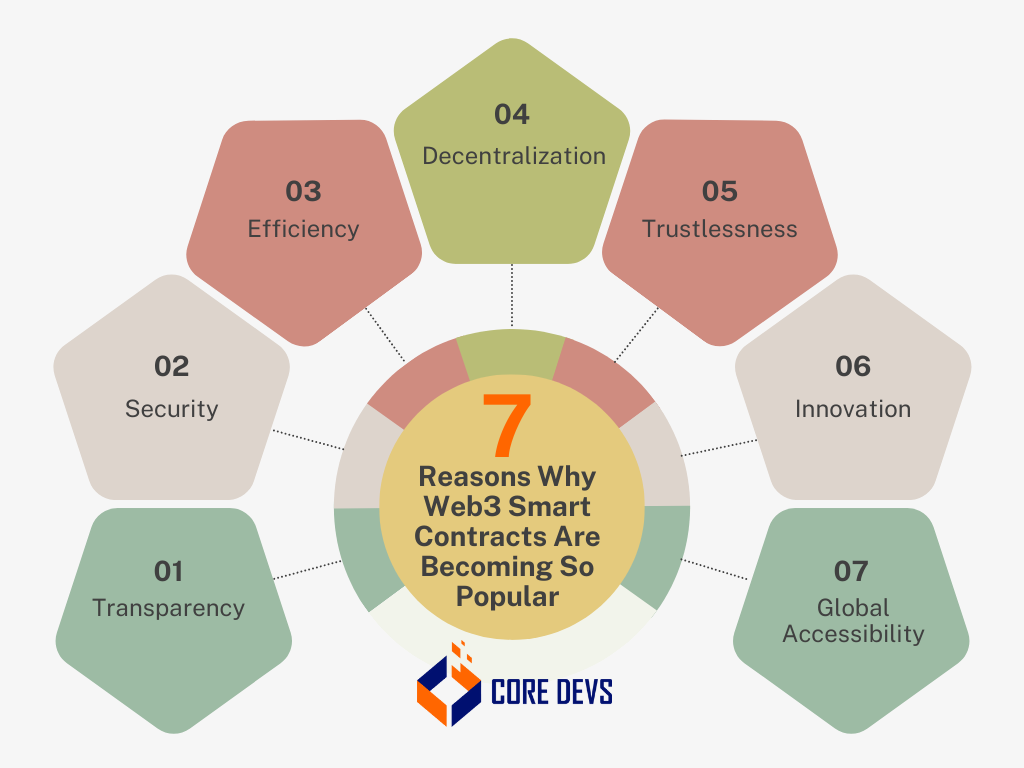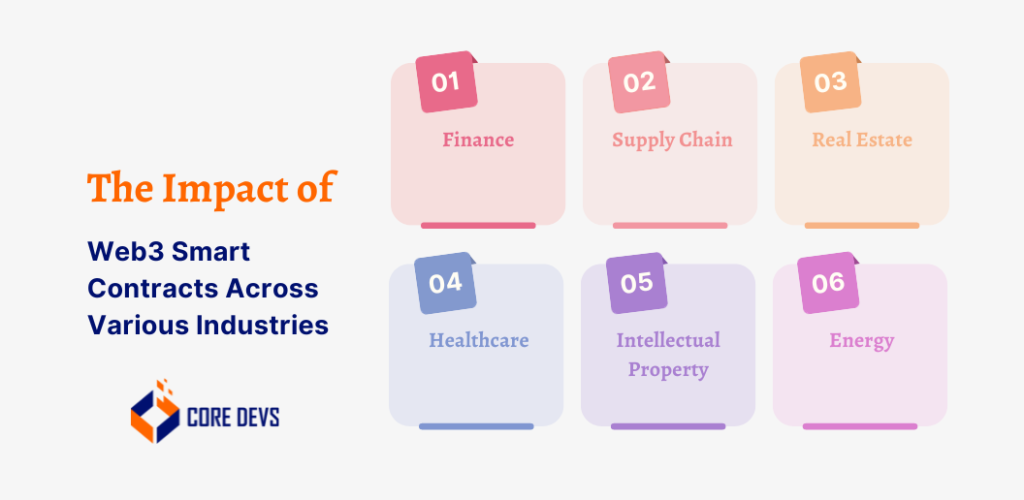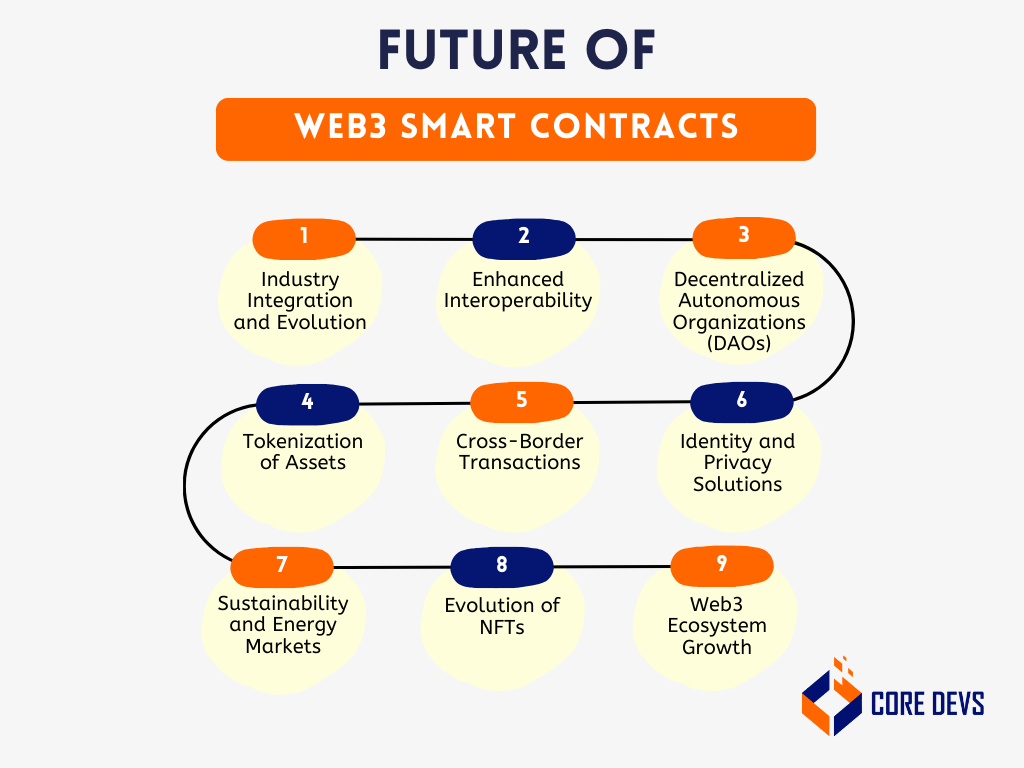In the ever-evolving digital technology landscape, How can we enhance security, efficiency, and transparency in our digital transactions?
The answer lies in the realm of Web3 Smart Contracts.
As we journey into the digital age, conventional business methods are transforming because of the revolutionary concept of Web3 Smart Contracts.
These contracts, built on blockchain technology, offer a promising solution to various challenges plaguing traditional systems.
Here, we’ll introduce you to the top 4 Web3 Smart Contract benefits that reshape industries and redefine trust in our interconnected world. So, let’s begin!
What Are Web3 Smart Contracts?
Web3 Smart Contracts are self-executing contracts with agreement terms directly written into code. They operate on decentralized platforms, primarily on blockchain technology.
A smart contract is a self-executing contract where the terms of agreement or conditions are written into lines of code. When we talk about “Web3 Smart Contracts”, we’re emphasizing the integration of smart contracts into this new decentralized web structure.
Unlike traditional contracts, they don’t require intermediaries; they automatically execute once set conditions are met. This digital automation ensures high levels of transparency, security, and efficiency.
Web3 Smart Contracts are trustless agreements, meaning they’re executed as per the code without the need for trust between parties.
As an integral part of the Web3 ecosystem, they play a pivotal role in decentralized applications and platforms, paving the way for a more autonomous and decentralized digital world.
What Is Making Web3 Smart Contracts So Popular?
Web3 Smart Contracts are gaining popularity due to the following:

- Transparency: They offer unparalleled transparency by recording all actions on a public blockchain, visible to all participants.
- Security: The cryptographic nature of Web3 Smart Contracts ensures resistance to hacking and unauthorized alterations, enhancing data security.
- Efficiency: Automation eliminates intermediaries, streamlining processes and reducing delays, making transactions faster and cost-effective.
- Decentralization: Operating on decentralized networks, they reduce reliance on central authorities, enhancing censorship resistance and trust.
- Innovation: Web3 Smart Contracts drive innovation by enabling new business models and applications in diverse sectors.
- Global Accessibility: Their decentralized nature grants access to individuals worldwide, including those excluded from traditional financial systems.
How Do Web3 Smart Contracts Function?
Web3 Smart Contracts, the backbone of decentralized applications, operate through a meticulously orchestrated series of steps that leverage coding, blockchain technology, and automated execution. This intricate process brings forth unparalleled transparency, efficiency, and security to digital interactions.
Let’s identify and discuss the multifaceted functioning of Web3 Smart Contracts:

Now we will discuss the 6 steps through which this whole process takes place, and web3 smart contracts work –
Step 1: Creation and Coding
At the genesis of a Web3 Smart Contract lies the expertise of developers who meticulously translate real-world agreements into lines of code.
These developers encode the contractual terms, obligations, and actions required for execution.
The programmable nature of the code encapsulates conditions, actions, and outcomes, laying the foundation for an autonomous and secure digital contract.
Step 2: Deployment on Blockchain
Once the code is meticulously crafted, it’s deployed onto a blockchain. This deployment transforms the code into a tamper-resistant, immutable entity.
The blockchain’s decentralized nature ensures that the contract’s terms are visible to all participants, eradicating information asymmetry and fostering trust among parties.
Any alterations or tampering attempts are nearly impossible due to the distributed ledger’s consensus mechanism.
Step 3: Automatic Execution
The true magic of Web3 Smart Contracts emerges in their ability to execute autonomously. When predefined conditions embedded in the contract’s code are met, the contract springs into action.
This automation negates the requirement for intermediaries or manual intervention, reducing the chances of errors, biases, and delays that often accompany traditional contract execution.
Step 4: Validation and Consensus
Transactions within the Web3 Smart Contract undergo a validation process involving the consensus of network nodes. These nodes collaboratively verify the transactions, ensuring their accuracy and authenticity.
This validation, achieved through consensus mechanisms such as proof-of-work or proof-of-stake, shields the contract from potential vulnerabilities and ensures that all parties adhere to the established rules.
Step 5: State Update and Transparency
As the Web3 Smart Contract executes and transactions occur, the blockchain’s state undergoes updates to reflect these changes. This evolving ledger maintains an irrefutable record of all interactions, rendering transparency and accountability paramount.
Participants can trace the entire history of actions within the contract, fostering trust and minimizing disputes.
Step 6: Autonomy and Trustless Operation
A defining attribute of Web3 Smart Contracts is their trustless operation. This term doesn’t imply a lack of trust but rather trust rooted in code rather than subjective intent.
Parties engaging with the contract rely on the pre-programmed rules and logic, reducing the need for blind trust in counterparts. The contract’s execution is determined by code, ensuring consistency and predictability.
Web3 Smart Contracts operate autonomously, ensuring accuracy, transparency, and security while eliminating the need for intermediaries in various digital interactions.
What Is the Origin of Web3 Smart Contracts?
The concept of Web3 Smart Contracts originates from the vision of decentralization championed by blockchain technology. In 1996, computer scientist Nick Szabo introduced the idea of “smart contracts” as self-executing agreements with code.
Ethereum, launched in 2015, transformed this concept into Web3 Smart Contracts by enabling complex scripting on a blockchain. Ethereum’s Solidity language allowed developers to create decentralized applications (dApps) with automated, tamper-resistant contracts.
These contracts expanded beyond financial use cases, revolutionizing various industries by enhancing digital transaction transparency, security, and efficiency.
What Are the Top 4 Benefits of Web3 Smart Contracts?
Web3 Smart Contracts herald a paradigm shift in how agreements are established and executed within the digital realm. These contracts offer a plethora of benefits that transcend traditional transactional models.
Let’s learn the intricacies of each benefit:

1. Transparency and Immutability
At the heart of Web3 Smart Contracts lies unparalleled transparency. Every transaction and action is documented on a public blockchain, visible to all participants. This transparency fosters trust by enabling parties to verify and track the evolution of the contract independently.
Immutability, a hallmark of blockchain technology, ensures that once information is recorded, it remains unalterable. This incorruptibility eliminates the risk of disputes arising from conflicting interpretations.
2. Security and Trust
Security forms the bedrock of Web3 Smart Contracts. Their execution is grounded in code, obviating the need for human intermediaries. This code-driven execution guarantees that the contract will function precisely as programmed, enhancing security and predictability.
The cryptographic underpinning of blockchain technology ensures that data is secure and resistant to tampering. This instills trust among participants, as the contract’s execution is governed by logic, not subjective intentions.
3. Efficiency and Cost Savings
Web3 Smart Contracts streamline and accelerate processes by removing manual intervention. Automation ensures that contractual clauses are executed precisely as stipulated. This not only minimizes the potential for errors but also expedites transactions.
Eliminating intermediaries reduces administrative overhead and associated fees, resulting in cost savings. This efficiency benefits parties by enabling swifter transactions and cost-effective operations.
4. Decentralization and Accessibility
Decentralization lies at the core of Web3 Smart Contracts. Operating on blockchain networks that lack central control, contracts are resistant to censorship and single points of failure. This decentralized nature enhances reliability and resilience.
These contracts extend financial access to individuals traditionally excluded from conventional systems. This inclusivity aligns with the broader ethos of democratizing financial opportunities.
The benefits of Web3 Smart Contracts are far-reaching, reshaping the landscape of digital transactions.
They encapsulate transparency, security, efficiency, and inclusivity, nurturing an environment where trust is fortified by technology and where agreements are executed autonomously, revolutionizing industries and empowering participants across the globe.
How Can Various Industries Benefit from Web3 Smart Contracts?
In the realm of digital innovation, Web3 Smart Contracts stand as a groundbreaking advancement, wielding the potential to reshape established business models.
Let’s explore the transformative capabilities of these contracts in six pivotal industries:

1. Finance
The finance sector is undergoing a revolution with Web3 Smart Contracts at its helm:
- DeFi Revolution: Platforms like Aave and Compound revolutionize lending and borrowing, managing assets worth billions through automated protocols.
- Tokenized Assets: By tokenizing assets, from stocks to real estate, these contracts enable fractional ownership, democratizing investment opportunities.
2. Supply Chain
The supply chain industry embraces unparalleled transparency powered by Web3 Smart Contracts:
- Traceability Across the Chain: Through platforms like IBM’s Food Trust, products’ journey is traceable, ensuring authenticity and mitigating risks.
- Decentralized Global Trade: Innovations like Skuchain automate trade processes, offering real-time tracking and automated compliance.
3. Real Estate
Real estate ventures into a new era of efficiency and accessibility:
- Automated Transactions: Propy automates property transactions end-to-end, establishing transparency and tamper-proof records.
- Tokenized Ownership: Fractional ownership, achieved by tokenizing properties, democratizes real estate investment avenues.
4. Healthcare
Healthcare experiences a paradigm shift with enhanced patient data security:
- Decentralized Health Records: MedicalChain’s decentralized health record system empowers patients with data control, facilitating efficient research with consent.
- Drug Traceability: Web3 Smart Contracts trace pharmaceuticals, ensuring authentic products reach consumers.
5. Intellectual Property
Intellectual property embraces a new dimension of value and security:
- NFT Revolution: NFTs redefine the art market, exemplified by Beeple’s multi-million-dollar sales, providing artists with verified digital ownership.
- Automated Royalty Management: Smart Contracts facilitate automatic royalty distribution, ensuring creators receive fair compensation.
6. Energy
The energy sector embarks on a path toward decentralized energy management:
- P2P Energy Trading: Platforms like Grid+ enable consumers to trade energy directly, promoting green energy and reducing utility reliance.
- Decentralized Grid Management: Smart Contracts optimize energy distribution via IoT integration, curbing wastage and ensuring efficient grid performance.
As Web3 Smart Contracts intricately integrate into these industries, they instigate an era marked by transparency, efficiency, and inclusivity. Though their journey is nascent, these contracts hold the potential to overhaul global economic systems, forging a future defined by equity and efficiency.
What Is the Future of Web3 Smart Contracts?
The future of Web3 Smart Contracts holds immense promise, poised to reshape industries, governance, and interactions on a global scale.
Several trends and possibilities emerge as indicators of this transformative journey:

1. Industry Integration and Evolution
As industries recognize the benefits of Web3 Smart Contracts, their integration will deepen. Finance, supply chain, healthcare, real estate, and more will increasingly adopt these contracts to streamline processes, enhance transparency, and reduce costs.
2. Enhanced Interoperability
Web3 Smart Contracts will evolve to ensure compatibility across different blockchain platforms. This interoperability will enable seamless communication and interaction between contracts on various networks, fostering a more interconnected digital ecosystem.
3. Decentralized Autonomous Organizations (DAOs)
The concept of DAOs, organizations governed by code and operated by Smart Contracts, will flourish. DAOs will enable decentralized decision-making, empowering stakeholders while eliminating centralized control.
4. Tokenization of Assets
Web3 Smart Contracts will be pivotal in tokenizing a wider array of assets, from real estate to intellectual property. This fractional ownership democratizes access to investments, liquidity, and markets.
5. Cross-Border Transactions
The borderless nature of blockchain technology and Web3 Smart Contracts will facilitate frictionless cross-border transactions. This can disrupt traditional remittance, trade, and payment systems, driving financial inclusion and efficiency.
6. Identity and Privacy Solutions
Smart Contracts will power decentralized identity solutions, giving individuals control over their personal data. These solutions will foster privacy while allowing secure and authenticated interactions.
7. Sustainability and Energy Markets
Web3 Smart Contracts will catalyze the transition to sustainable energy. P2P energy trading, energy-efficient smart grids, and carbon credit markets will harness these contracts’ decentralized and transparent nature.
8. Evolution of NFTs
NFTs will evolve beyond digital art to encompass a wider range of assets, such as virtual real estate, virtual goods, and even ownership of physical assets, leading to new monetization avenues.
9. Web3 Ecosystem Growth
The overall Web3 ecosystem will expand as more applications, platforms, and tools emerge to support the development and deployment of Smart Contracts. This growth will fuel innovation and collaboration across various sectors.
The future of Web3 Smart Contracts is dynamic and transformative. As they evolve and gain traction, these contracts redefine how we conduct transactions, collaborate, and govern.
Wrapping Up
In an era marked by rapid technological evolution, Web3 Smart Contracts emerge as the linchpin, orchestrating a symphony of efficiency, transparency, and empowerment across industries.
As these contracts become the backbone of decentralized systems, they pave the way for a future where trust is fortified by code, transactions are executed autonomously, and possibilities are boundless.
From finance to healthcare, supply chains to governance, the Web3 Smart Contract revolution is set to transcend barriers, ushering in an era where the potential of the digital world knows no bounds.
Embrace the evolution, for the Web3 journey has just begun!
